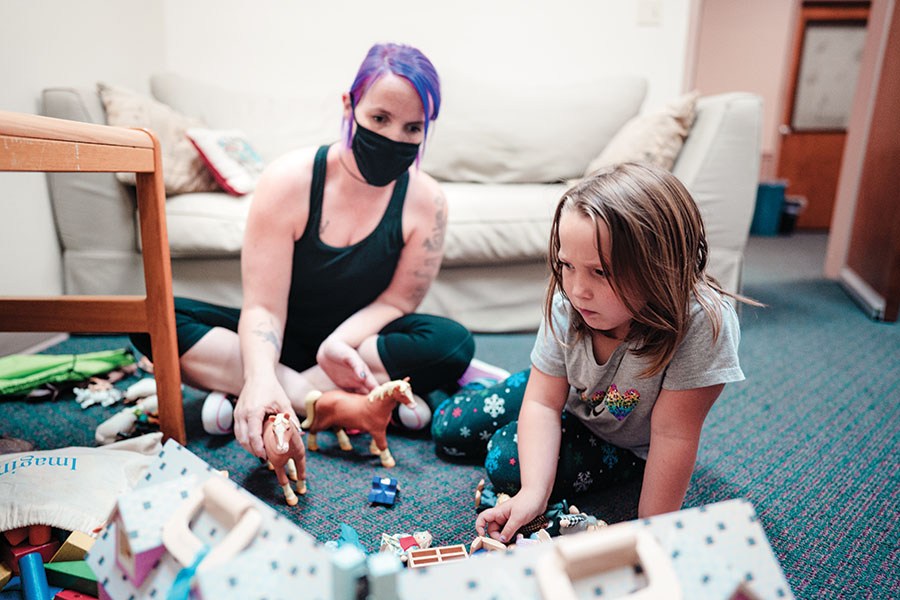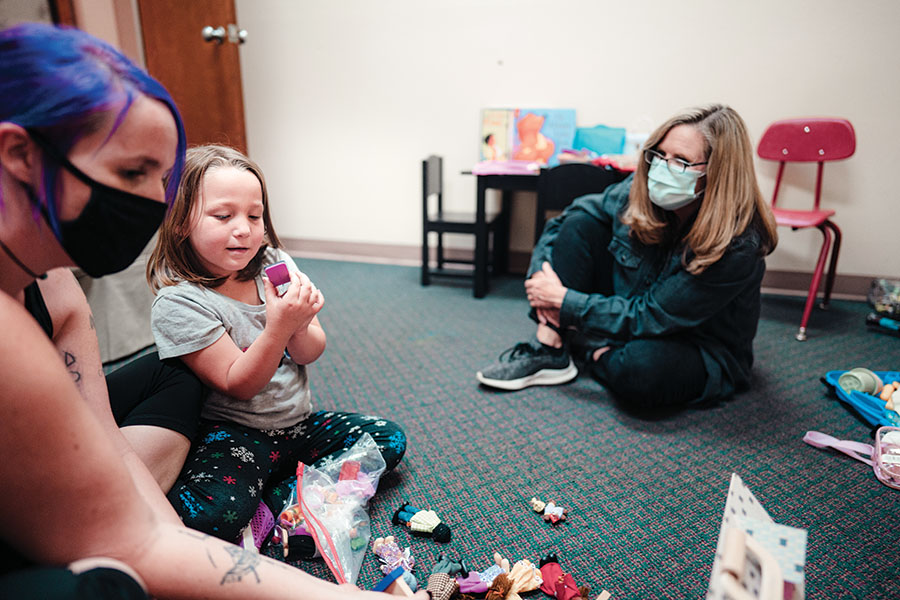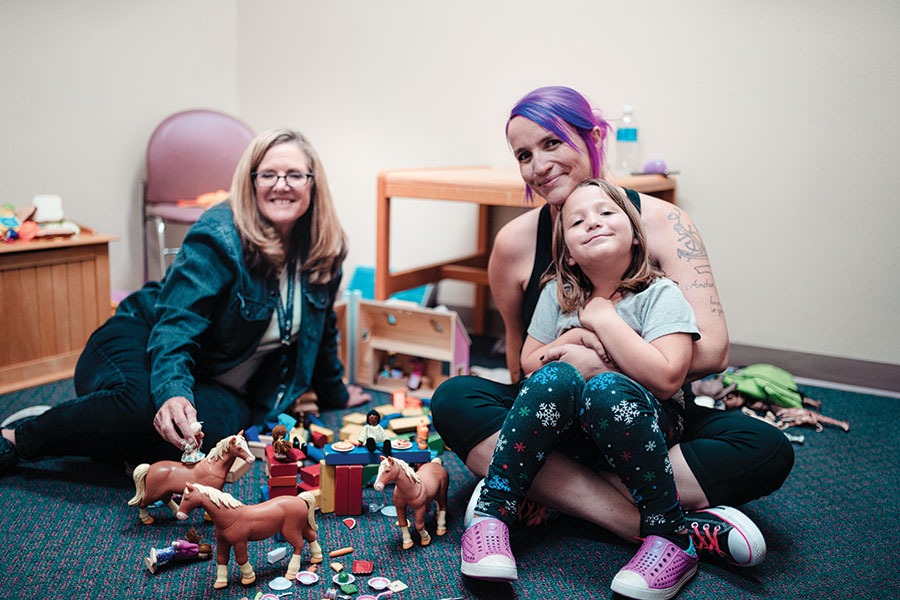In March 2015, Aubrey Aschliman was born premature. Her father, addicted to drugs, vanished from the picture immediately, serving more as a threat Amy Aschliman had to keep away than a support system on which she could rely. Emotional and demanding from a young age, Aubrey would ultimately be diagnosed with attention-deficit/hyperactivity disorder (ADHD), a sensory processing disorder and an oppositional defiant disorder—any one of which could fray a parent’s nerves. “I had such resentment,” Amy confesses, “toward her, toward her bio-dad, and the fact I was doing it all myself. I was constantly frustrated. I didn’t like being around her, which I know is a terrible thing to say about one of your children. But I couldn’t stand the sound of her voice, and it shouldn’t ever be like that.” Amy turned to The Florida Center for Early Childhood to help with therapy for Aubrey. And there, mental health therapist Jeanie DeLa, LMHC, offered a suggestion. Would the mother and daughter like to participate in a new treatment known as Child-Parent Psychotherapy (CPP)? At that point, Amy felt ready to try anything and signed up. In a few short months, she says her relationship to her now six-year-old daughter has transformed.

PHOTOGRAPHY BY WYATT KOSTYGAN
The story of the Aschlimans is one example of how the new therapy has changed the quality of life for families in the region (and far beyond). The mother and daughter go to weekly meetings with therapists, and devote a minimum of one hour per week to focusing only on their parent-child bond (one too often brushed aside for reasons such as picking up a shift at work). “It’s done wonders, and really makes me sit back and enjoy being with just her,” Amy Aschliman says. “She and I enjoy our Wednesdays, where there’s just an hour of the two of us playing together. My parents never played with me, and we never had that time before. In the crucial years of her growing up, we never got that bonding time. Instead, it was just me stressing out and figuring how to pay my bills.”

PHOTOGRAPHY BY WYATT KOSTYGAN
Amy Aschliman is not alone. Therapists say too many families, even when they recognize the damage a traumatic event could cause a child, fail to recognize how something as simple as a positive relationship with a parent will help. That’s exactly what CPP aims to restore.
That’s why, for the past one-and-a-half years, the Charles & Margery Barancik Foundation has provided a $300,000 grant to the Florida State University Center for Prevention and Early Intervention to help train a Sarasota cohort of mental health clinicians in the practice of CPP. To make sure every family that needs it can find ready access to CCP, a cohort of regional licensed therapists formed last year, and prepared to teach others about the effectiveness of the practice. A final session for the group convened in January, and professionals trumpeted the value of “the power of a parent to heal their child.”
Kristie Skoglund, the chief operating officer for The Florida Center for Early Childhood, says the therapy has been deployed in childhood court to great success in the 12th Judicial Circuit. “The child welfare system has been a big referral source,” she says. Programs like Healthy Family and Healthy Start often serve families with a child exposed to trauma, or expectant mothers exposed to trauma. There has actually been enough demand for service that there is a bottleneck of clients waiting, according to the Barancik Foundation. That is why it is so important that therapists learn not just how to lead the therapy but also how to teach it.
Heidy Garcia, one of the cohort’s experts in psychotherapy training, says the use of CPP has been especially important lately—as courts try to keep families together, and as loved ones spend so much more time each day together due to remote work and virtual education. “We all get hurt in relationships and we all get healed in relationships,” she says. “That’s the reality.” It’s easy, she says, for parents to underestimate the role every little action they play in a child’s life can impact them. But a bad relationship between a mother or father with a young child can diminish self-worth throughout a lifetime.
“Helping understand the power of that relationship is what we, as clinicians, aim for,” Garcia says. “If I’m the mother of a five-year-old child, if I tell my daughter that Santa is coming on Christmas Eve, she believes me. If I tell her the Tooth Fairy is coming to put money under her pillow, she believes me. If I tell her there is a treasure at the end of a rainbow, she believes me. By the same token, if I tell mean things to my daughter, if I say, ‘You are stupid’ or ‘not worth it,’ if I say, ‘You are a monster’ or ‘You are as horrible as your dad who used to beat me,’ she would believe me.”
This makes CPP especially valuable in helping a child cope with a variety of family problems. If the state removes a child from an abusive home but still wants to reunify the parent and child, the therapy can help restore the family dynamic to make a physically and emotionally safer environment.
But it can prove valuable in helping small children deal with a variety of traumas, of which the world has plenty to shovel. The pandemic has introduced tragedy into the lives of many children, whether directly from the death of a family member or indirectly by exposing children at home all day to domestic abuse. But whatever the cause, therapists see family relationships as one of the greatest tools in allowing children to cope.
Joy Osofsky, PhD, a professor in Louisiana State University’s Departments of Psychiatry and Pediatrics, was among the leaders for the sessions. She says the entire mental health field has been impacted by the pandemic. That could be seen clearly in the fact that the cohort, which convened its first gathering in person, has had to work almost entirely on Zoom.
“The trainees in the Sarasota cohort have been phenomenal. And I will tell you I had a lot of nervousness and apprehension,” Osofsky says. “But you could hear the confidence starting to build. It proved to be a shining moment, and that has helped pull us together as a group.” There was some practical benefit as well. Therapists, often for the first time last year, had to provide therapy through video-conferencing rather than personal sessions. That has started to ease up, but it has raised confidence all the more in the power of the therapy (even when overseen through webcams and monitors).
As for Amy and Aubrey Aschliman, their bond has continued to grow. Recently, following the death of Aubrey Aschliman’s paternal grandmother, the child’s now-sober father has started to slowly reenter her life. Amy Aschliman holds some trepidation about how that process will proceed, but she appreciates more than ever the value a solid relationship with a parent can be for her daughter. “We’re seeing a therapist together and connect once every other week, and we will talk about how things are going from home,” Amy says.
Amy Aschliman is in a new relationship and has a fourth child with her partner. Life goes on, hopefully to a brighter and emotionally healthier future. To that end, she feels blessed to continue CPP with Aubrey. “If I wasn’t doing this course, I would be flipping out and ripping my hair out, not knowing what to do,” she says. “When you become a parent, nobody tells you what to do or how to do things. You just go based on your instincts and how you were parented.”
She is careful not to criticize her own parents, who she says were great but made mistakes and could make her feel forgotten at times. There are ways to improve your own parenting style, Amy says. Children have no life experience to draw upon and cannot be the guides to a better parent-child relationship; that’s up to the adults in the family. “We have got to do better now,” Amy says. “The cycle of parenting from what our parents show us has to end with us.” SRQ









